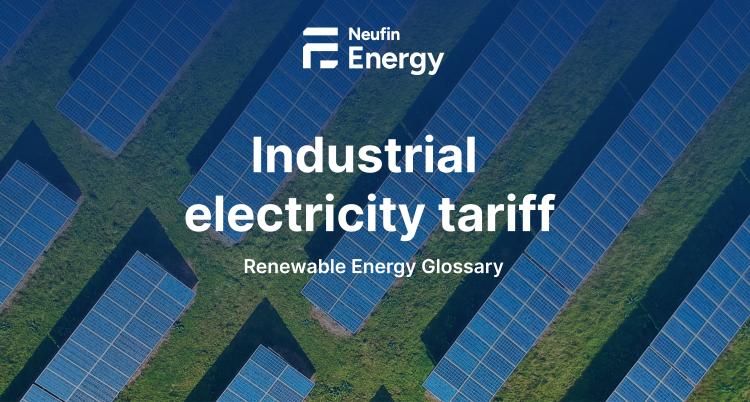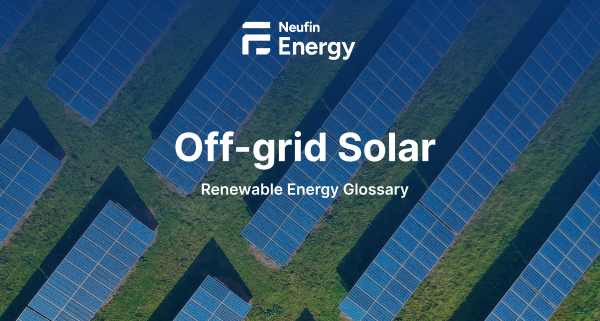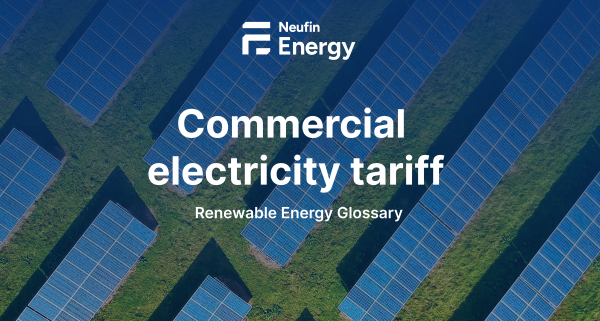Quick definition: Industrial electricity tariff is a structured electricity pricing system specifically designed for industrial consumers, incorporating factors like peak demand, time of use, and power factor to determine the final electricity costs.
Table of contents
- Understanding industrial tariffs
- India-specific context
- Practical applications
- How Neufin can help?
- Related terms
- FAQs
- Additional resources
Understanding industrial electricity tariffs
Industrial tariffs are complex pricing structures that utilities use to bill industrial consumers. These tariffs typically consist of multiple components:
- Fixed charges based on connected load
- Energy charges per unit consumed (kWh)
- Demand charges based on maximum demand (kVA)
- Time of day charges
To optimize industrial tariff usage, businesses can implement these four key strategies:
1. Load management and peak shifting
Redistributing power consumption to off-peak hours can significantly reduce costs. Industries can save 10-15% on electricity bills by shifting heavy loads to night hours when tariffs are lower.
2. Power factor improvement
Maintaining a power factor above 0.95 can lead to rebates in many states. Installing capacitor banks and regular maintenance can help achieve this target.
3. Maximum demand control
Implementing automated demand controllers can prevent penalty charges by keeping demand within contracted limits. This can save up to 20% on demand charges.
4. Energy efficiency measures
Adopting energy-efficient equipment and processes can reduce overall consumption, directly impacting the energy charges component of the tariff.
India-specific context
In India, industrial tariffs vary by state and are regulated by State Electricity Regulatory Commissions (SERCs). For example:
- Maharashtra: Offers ToD incentives of up to 20% during off-peak hours
- Gujarat: Provides special night tariffs for continuous process industries
- Tamil Nadu: Implements seasonal tariffs for specific industries
Practical applications
Real-world implementation strategies include:
- Installing smart meters for real-time monitoring
- Using energy management systems (EMS)
- Implementing automated load scheduling
- Regular energy audits and optimization
How Neufin can help?
Neufin helps helps industries optimize their tariff usage by making the switch to renewable energy. We provide the fastest way for companies to buy renewable energy in India. Companies choose Neufin because we provide –
- Guaranteed cost savings – Lower your electricity bills without operational headaches.
- End-to-end execution – From feasibility to power delivery, we handle everything.
- Zero upfront investment options – Easy and flexible financing through Neufin Capital
Related terms
- Time of day tariff
- Maximum demand
- Power factor
- Connected load
Frequently Asked Questions (FAQs)
What is the difference between industrial and commercial tariffs?
Industrial tariffs are designed for manufacturing units with higher power requirements and typically include demand charges, while commercial tariffs are simpler and meant for business establishments.
How can industries reduce their maximum demand charges?
Industries can reduce maximum demand charges by implementing load scheduling, using automatic demand controllers, and shifting non-critical loads to off-peak hours.
What is the significance of power factor in industrial tariffs?
Power factor indicates how efficiently power is being used. A higher power factor (>0.95) can lead to rebates, while a lower power factor may result in penalties.
Additional resources
- Bureau of Energy Efficiency (BEE) guidelines
- State Electricity Regulatory Commission websites
- Ministry of Power regulations
Last updated: January 2024
Disclaimer: Tariff structures and regulations may vary by state and are subject to change. Please consult your local electricity board for current rates and regulations.



